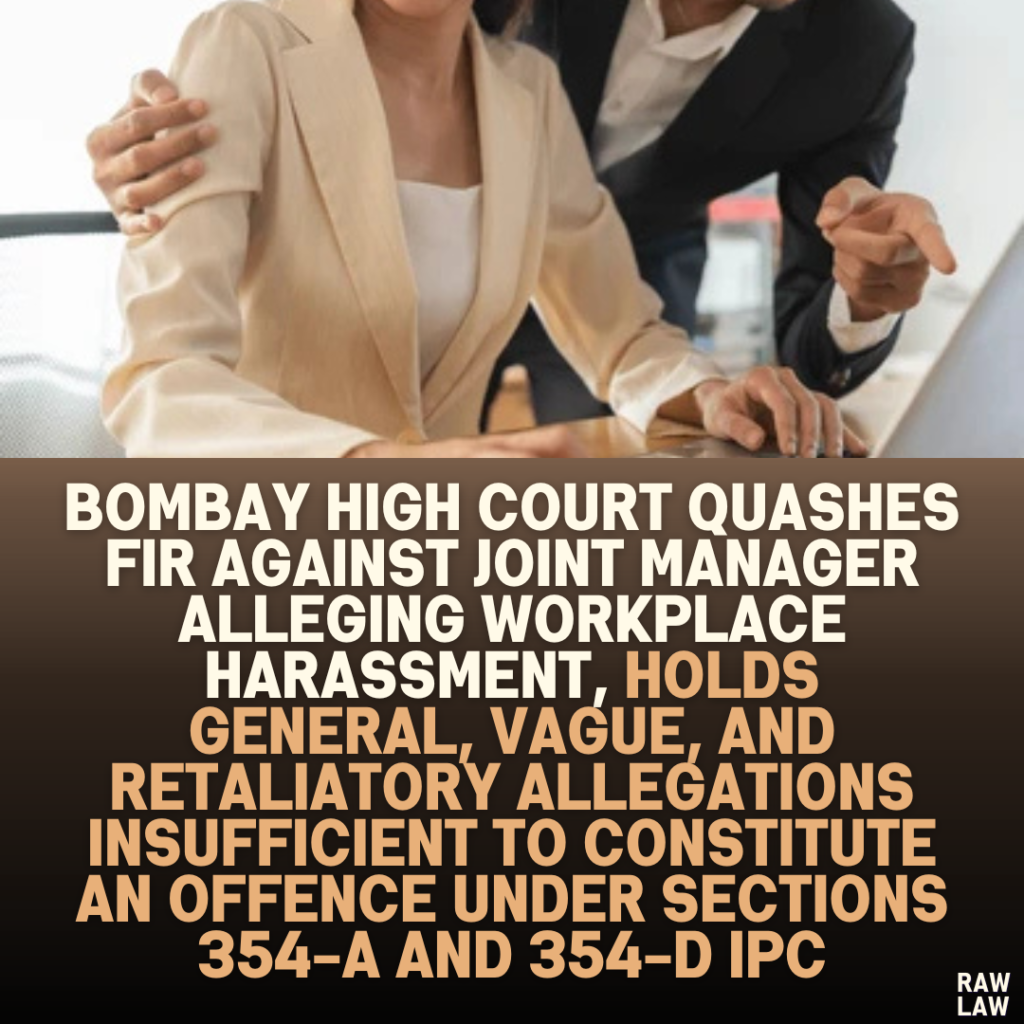Court’s Decision
The Bombay High Court quashed the First Information Report (FIR) registered under Sections 354-A (sexual harassment) and 354-D (stalking) of the Indian Penal Code (IPC) against the applicant. The court also set aside the charge sheet and criminal proceedings in the case, holding that the allegations lacked specificity and were general and retaliatory in nature. It emphasized that criminal prosecution should not proceed without substantial evidence, stating, “Facing criminal prosecution is a serious affair which one shall not be pushed into unless there is substantial material.”
Facts
- The Allegations:
- The complainant alleged that the applicant, a Joint Manager at Finlay Mill, Achalpur, harassed her, looked at her with “evil eyes,” used “filthy words,” and commented that she looked “sexy in a saree.”
- She claimed this conduct occurred from August 2017 onwards, culminating in a police complaint filed on April 29, 2021.
- The Counter-Allegation:
- On April 23, 2021, the complainant slapped the applicant in the mill premises. The applicant lodged a complaint about this incident with his superiors on April 24, 2021.
- In response, the complainant allegedly filed the harassment complaint to retaliate.
- Internal Inquiries:
- The mill’s internal inquiry committee, comprising the Assistant Manager and six others, and the Internal Complaints Committee (ICC) separately investigated the allegations. Both bodies exonerated the applicant, finding no evidence of harassment.
- Police Proceedings:
- Despite the inquiry findings, an FIR was lodged against the applicant, leading to the current application to quash the proceedings.
Issues
- Do the allegations in the FIR constitute offences under Sections 354-A and 354-D of the IPC?
- Were the criminal proceedings against the applicant initiated as an abuse of process to settle scores?
- Should the findings of the inquiry committees influence the quashing of the FIR?
Petitioner’s Arguments
The applicant’s counsel advanced the following contentions:
- Retaliation: The complaint was filed in retaliation for the applicant’s complaint against the complainant.
- Exoneration by Inquiries: Both the internal inquiry and ICC reports found the allegations baseless.
- Vague Allegations: The FIR did not mention any specific incidents or provide corroborative evidence.
- Legal Precedents: The applicant relied on the Supreme Court’s decision in Ashoo Surendranath Tewari v. Deputy Superintendent of Police, EOW, CBI and Another, asserting that criminal prosecution cannot continue when an inquiry exonerates the accused on merits.
Respondent’s Arguments
The respondents opposed the application on the following grounds:
- Prima Facie Evidence: The FIR and witness statements indicated that the applicant engaged in harassment and stalking.
- Criminal Investigation Warranted: The allegations warranted a detailed trial to ascertain the truth.
Analysis of the Law
- Criteria for Quashing FIRs:
- The court referred to State of Haryana v. Bhajan Lal, which outlines when FIRs can be quashed, such as when allegations are inherently improbable or fail to disclose a prima facie offence.
- Merit-Based Exoneration:
- The court applied the principle in Ashoo Surendranath Tewari, where it was held that criminal proceedings cannot continue if a related inquiry exonerates the accused on merits.
- Higher Standard of Proof in Criminal Cases:
- Unlike departmental inquiries, criminal trials require proof beyond reasonable doubt. If allegations fail even in a departmental inquiry, they are unlikely to meet the stringent evidentiary requirements of criminal prosecution.
Precedent Analysis
- Ashoo Surendranath Tewari Case:
- Criminal prosecution should not proceed when the accused is exonerated in an inquiry based on the same facts.
- State of Haryana v. Bhajan Lal:
- FIRs should be quashed if the allegations are vague, improbable, or intended to harass the accused.
Court’s Reasoning
- Exoneration in Inquiries:
- The internal inquiry committee and the ICC categorically found the allegations against the applicant unsubstantiated.
- Both inquiries noted that the complainant filed a false report, taking undue advantage of her gender.
- Delay in Filing Complaint:
- The complainant alleged harassment since 2017 but lodged her police complaint only in April 2021, after the applicant’s complaint against her. The court found this delay unexplained and indicative of retaliation.
- Lack of Corroboration:
- Witnesses did not corroborate the complainant’s version. Statements indicated no evidence of the alleged harassment or stalking.
- Vague and Omnibus Allegations:
- The court noted that the FIR lacked specific incidents or details to substantiate the charges under Sections 354-A and 354-D IPC.
Conclusion
The court held that the FIR and proceedings were an abuse of process, lacking sufficient material to justify prosecution. The FIR, charge sheet, and related proceedings were quashed.
Implications
- Fairness in Workplace Complaints:
- The judgment underscores the need for detailed and substantiated complaints in workplace harassment cases.
- Deterrent to Retaliatory Complaints:
- It discourages the misuse of legal provisions for settling personal scores.
- Reinforcement of Legal Standards:
- The case highlights the judiciary’s role in safeguarding individuals from unwarranted criminal prosecution based on vague or retaliatory allegations.



